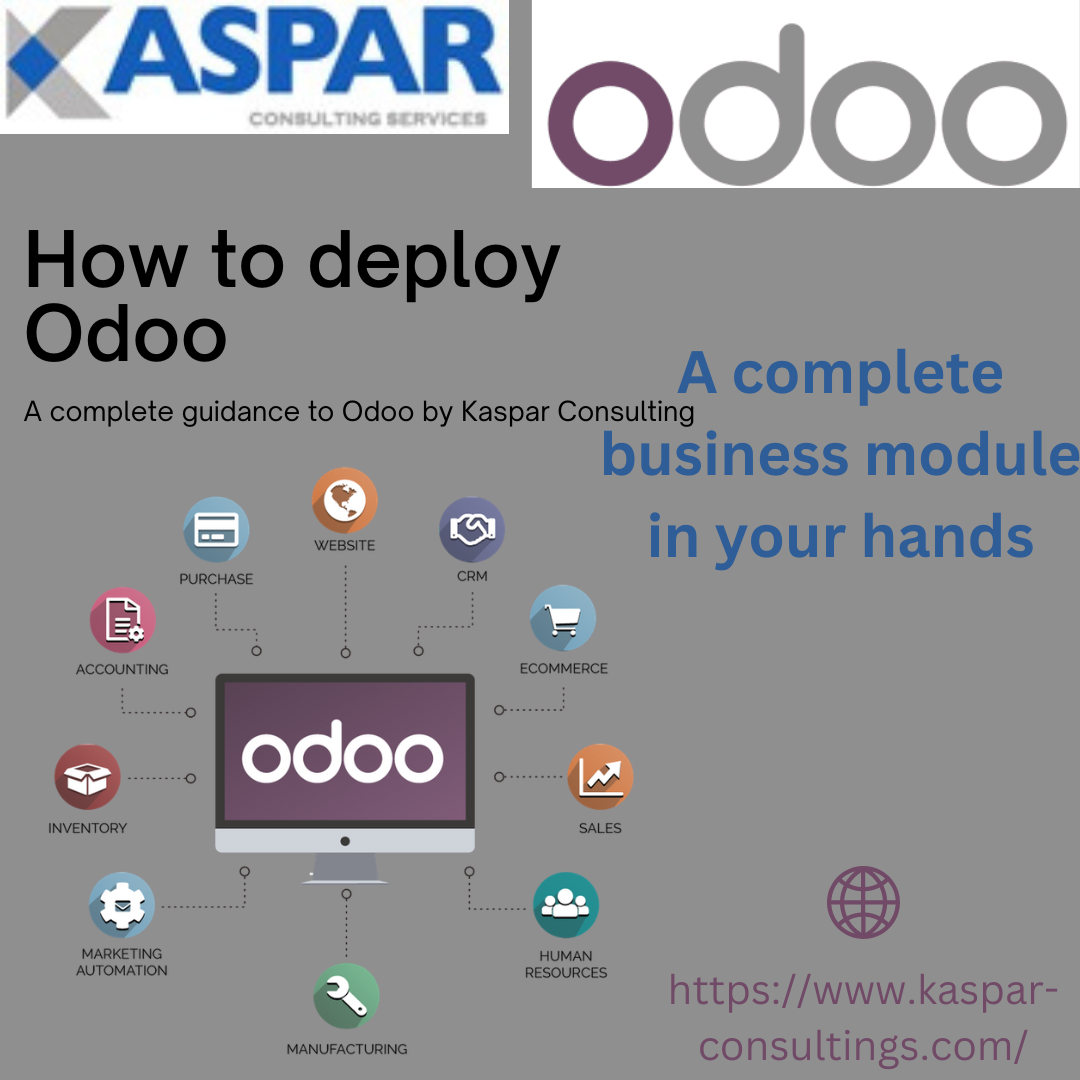- Odoo
- April 22, 2024
- 10 Minutes
How to deploy Odoo: A complete step by step guidance


Author
Asim Jibran
How to deploy Odoo: A complete step by step guidance
Deploying Odoo is a straight forward process, but it’s essential to follow the right steps for info about How to deploy Odoo and to ensure a smooth installation. Kaspar consulting is the best platform in Pakistan providing Odoo’s complete guide to “How to deploy Odoo”.
Visit the website now:
Here’s a step-by-step guide on How to deploy Odoo:
Choose Your Deployment Method
Odoo can be deployed on-premises or in the cloud. Decide whether you want to host it on your own server or opt for a cloud-based solution like AWS, Digital Ocean, or Google Cloud Platform.
System Requirements
Check the system requirements for running Odoo on your chosen platform. Ensure that your server meets the necessary specifications in terms of CPU, RAM, and storage.

Download Odoo setup
Visit the website and download the Odoo setup from there in to your PC/laptop. Once it will be downloaded you have to install it. Select the version (Enterprise is the licensed version whereas community version is available for free) that you want to download and click Download.

Choose the location to download it
Choose the location for the setup in your PC where you have to download it

Configure Odoo
Open the Odoo configuration file and modify the necessary settings. And then start downloading the setup by clicking the Next Button

Install Odoo Dependencies
Run the Odoo installation file, which will automatically install all required components once you agree to the terms and conditions provided by in Odoo agreement.

Start Odoo Service
Start the Odoo service on your server using the command specified for your operating system. This will launch Odoo and make it accessible via the web browser.

Access Odoo Web Interface
Open your web browser and enter the server’s IP address or domain name followed by the port number used for Odoo(by default, it is port 8069). You should now see the Odoo login page.
Create an Administrator Account
Create an administrator account for Odoo by providing the required details on the login page. This account will have full access to configure and manage Odoo.
Install Apps and Modules
Odoo offers a range of applications and modules to extend its functionality. Install the ones you need for your business, such as CRM, Sales, Inventory, and HR.
Customize and Configure Odoo
Once the essential modules are installed, customize and configure Odoo according to your business requirements. Set up your company details, add users, and configure workflows.
Testing and Deployment
Before deploying Odoo in a live environment, thoroughly test all functionalities to ensure everything works as expected. This testing phase helps catch any issues or bugs that need to be resolved before going live.
Launch Odoo in Production
Once you are satisfied with the testing phase, it’s time to launch Odoo in production. Update your DNS settings (ifusing a domain) and finalize any security measures required to protect your Odoo instance.

Implement Security Measures
As Odoo will contain sensitive business data, it’s crucial to implement robust security measures. Configure user access rights carefully, ensuring that each user can only access the modules and data relevant to their role. Additionally, keep Odoo and all its components updated with the latest security patches to safeguard against potential vulnerabilities.
Monitor Performance
Regularly monitor the performance of your Odoo instance to identify any bottlenecks or performance issues. Keeping an eye on resource utilization, response times, and system stability will help you proactively address any potential problems and ensure a smooth user experience.
Backup Regularly
Data loss can be disastrous for any business, so set up regular backups of your Odoo database and files. Choose are liable backup solution and schedule automatic backups to ensure that your critical data is safe in case of any unforeseen events.
Seek Professional Support (if needed) for How to deploy Odoo
If you encounter complex issues or need assistance with specific customizations, consider seeking professional support from an experienced Odoo consultant or a reputable Odoo service provider. They can offer valuable insights and solutions to optimize your Odoo deployment.
Stay Updated
Odoo regularly releases updates and new versions with enhanced features and bug fixes. Keep yourself informed about the latest updates and improvements to take advantage of new functionalities and ensure that your Odoo instance remains up-to-date and secure.
Continuous Improvement
Odoo is a versatile platform that can adapt to your evolving business needs. Encourage feedback from your team and users, and continuously look for ways to improve your Odoo deployment. Regularly review your processes and workflows to ensure that Odoo aligns with your changing requirements.
Explore Integrations
Odoo’s flexibility allows for seamless integration with other applications and systems. Look for opportunities to integrate Odoo with your existing tools, such as marketing automation, project management, or external databases, to further enhance your business processes.
Share Best Practices
If you have multiple users or departments working on Odoo, encourage the sharing of best practices and success stories. Regular knowledge sharing sessions can lead to improved efficiency and innovation within your organization.
Stay Engaged with the Odoo Community
Odoo has a vibrant community of users, developers, and experts. Engaging with this community can provide valuable insights, access to new add-ons, and solutions to challenges you might face during your Odoo journey.
Celebrate Success
As you witness the positive impact of Odoo on your business processes and overall efficiency, take the time to celebrate the success with your team. Recognize the efforts put into deploying Odoo and the improvements it brings to your organization.
By following these steps and continuously optimizing your Odoo deployment, you can unlock the full potential of this powerful ERP platform, streamline your business operations, and take your business to new heights of success!
Congratulations! You have successfully deployed Odoo, and it’s ready to power your business processes and operations. Remember to keep your Odoo installation updated with the latest releases and security patches for optimal performance and security. Happy Odoo-ing!
Kaspar Consulting role in How to deploy Odoo in Pakistan
At Kaspar Consulting, we take Odoo deployment to the next level, ensuring a seamless and efficient implementation process for your business. With our expert team of Odoo consultants, we guide you through each step of the deployment journey, making it a smooth and rewarding experience. Here’s how we make Odoo deployment a breeze:
Understanding Your Business Need
Our first step is to deeply understand your business processes, goals, and requirements. By closely collaborating with your team, we gain valuable insights into how Odoo can be tailored to suit your unique needs.
Tailored Odoo Configuration
We customize Odoo to perfectly align with your business processes. From defining user roles and access rights to configuring modules and workflows, our experts ensure that Odoo is optimized for your organization.
Data Migration and Integration
If you’re migrating from another system, we handle the data migration process with precision, ensuring the seamless transfer of your valuable information to Odoo. We also integrate Odoo with any existing tools or applications to create a unified ecosystem.
User Training and Support
We believe that user empowerment is essential for successful Odoo adoption. Our team provides comprehensive training sessions to equip your staff with the knowledge and skills to use Odoo effectively. We also offer ongoing support to address any queries or concerns that may arise.
Security and Performance Optimization
At Kaspar Consulting, we prioritize the security and performance of your Odoo instance. We implement robust security measures and regularly monitor the system’s performance to ensure a secure and smooth experience for your users.
Customization and Add-ons
To further enhance Odoo’s capabilities, we develop custom modules and integrate third-party add-ons as needed. This allowsyou to tailor Odoo precisely to your business requirements.
Continuous Improvement
Our partnership with you doesn’t end with deployment. We believe in continuous improvement and stay engaged with your organization to provide ongoing support, address evolving needs, and explore new opportunities for optimization.
Transparent Communication
Throughout the Odoo deployment process, we maintain clear and transparent communication with your team. We keep you updated on the progress, share insights, and seek your feedback to ensure that we are always aligned with your vision.
Cost-Effective Solutions
At Kaspar Consulting, we are committed to delivering value for your investment. Our solutions are cost-effective, ensuring that you receive a high return on your Odoo deployment.
Customer Satisfaction
Our ultimate goal is your satisfaction. We take pride in exceeding your expectations and delivering solutions that drive real business outcomes. Your success is our success!
With Kaspar Consulting as your trusted Odoo deployment partner, you can rest assured that your journey with Odoo will be smooth, efficient, and empowering. Let’s embark on this exciting Odoo adventure together and unlock the full potential of this powerful ERP platform for your business!
Visit Odoo now:
FAQ’s about How to deploy Odoo
1. What are the system requirements of How to deploy Odoo?
Odoo can run on various operating systems, including Linux, Windows, and macOS. The specific system requirements depend on the version of Odoo and the number of users. Generally, it requires sufficient RAM, CPU, and disk space to ensure smooth performance.
2. What are the steps involved in deploying Odoo on a server?
The typical steps for deploying Odoo include:
a. Installing necessary dependencies and libraries
b. Setting up a PostgreSQL database
c. Downloading and configuring Odoo
d. Creating a configuration file
e. Running the Odoo server
3. Is technical expertise required for Odoo deployment?
Some technical knowledge is required to deploy Odoo, especially when setting up on a server. However, there are user-friendly installation tools and pre-configured images available for cloud deployment that can simplify the process provided by kaspar consulting
4. Can I deploy Odoo for multiple companies within myorganization?
Absolutely, Odoo allows multi-company setups, enabling you to manage multiple businesses or subsidiaries from a single instance of the ERP system, providing a unified view of operations anddata.





2 Responses